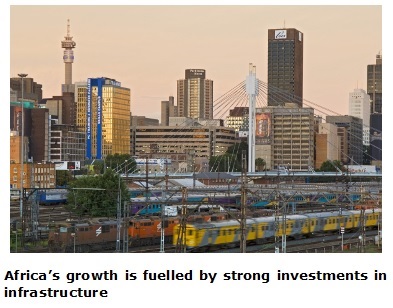 ReConnect Africa is a unique website and online magazine for the African professional in the Diaspora. Packed with
essential information about careers, business and jobs, ReConnect Africa keeps you connected to the best of Africa.
ReConnect Africa is a unique website and online magazine for the African professional in the Diaspora. Packed with
essential information about careers, business and jobs, ReConnect Africa keeps you connected to the best of Africa.



 There is a positive economic outlook for Africa, says the annual report from the African Development Bank
There is a positive economic outlook for Africa, says the annual report from the African Development BankAfrica can achieve sustainable economic growth and development if it plays a more active role in global economics, according to the latest African Economic Outlook report from the African Development Bank (AfDB).
“In order to sustain the economic growth and ensure that it creates opportunities for all, African countries should continue to rebuild shock absorbers and exercise prudent macro management. Any slackening on macro management will undermine future economic growth,” said Mthuli Ncube, Chief Economist and Vice-President of the AfDB in a statement.
“In the medium- to long-term, the opportunity for participating in global value chains, should be viewed as part as part of the strategy for achieving strong, sustained and inclusive growth,” he said.
The African Economic Outlook report is produced annually by the AfDB, the Organisation for Economic Co-operation and Development (OECD) Development Centre and the United Nations Development Programme (UNDP). This year’s report shows that Africa has weathered internal and external shocks and is poised to achieve healthy economic growth rates.
Africa’s Economic Potential
The report is bullish on Africa’s growth potential. It anticipates the continent’s economy to push to 4.8% in 2014, and then 5 to 6% in 2015, driven by domestic demand, infrastructure and increased trade in manufactured goods. However, the report states, Africa has to participate more effectively in regional and global value chains, a move that will serve as a catalyst for economic diversification, domestic resource mobilisation and investment in critical infrastructure on the continent.
“In order to do so, however, the continent needs to avoid getting stuck in low value-added activities.
“For instance, Africa’s exports to the rest of the world grew faster than those of any other region in 2012, but they remain dominated by primary commodities and accounted for only 3.5% of world merchandise exports in 2012,” says the report.
Africa can avoid the trap by investing in new and more productive sectors, building skills, creating jobs and acquiring new technology and market information. South Africa is a good example of an African country which has avoided this trap, according to the report.
South Africa
“[South Africa] achieved a remarkable turnaround in its automotive industry by removing obstacles and providing incentives for component producers and assembly lines. It also shows that the development of agribusiness value chains in countries such as Ghana, Kenya and Ethiopia has contributed to economic growth and job creation.”
Commenting on the Africa’s economic potential, director of the OECD Development Centre, Mario Pezzini, said countries on the continent have a great potential “to build on their demographic dynamism, rapid urbanisation and natural- resources assets”.
“The challenge now for many of them is to ensure that greater insertion into global value chains is achieved and has a positive impact on people’s lives.
“Public policies need to be articulated in a targeted strategy that promotes more equitable economic and social transformation and an environmentally sound development,” said Pezzini.
Human Development
On the social development front, the report notes that there has been remarkable progress in human development, with lower poverty levels, rising incomes and improving rates of school enrolment and health coverage.
However, to achieve real human development gains requires empowering people and ensuring environmental sustainability, so that economic growth can yield benefits for all.
Pedro Conceição, Chief Economist at UNDP’s Regional Bureau for Africa, said that as engagement with global value chains deepens, the appropriate measures need to be in place to mitigate the risks which they can bring about, such as volatile prices, unfair competition and increased vulnerability. “While regional and global economic networks present immense opportunities, women, men and communities must be able to compete from a position of strength,” he said.
Top image: Chris Kirchhoff, mediaclubsouthafrica.com
This article was first published on www.SouthAfrica.info
